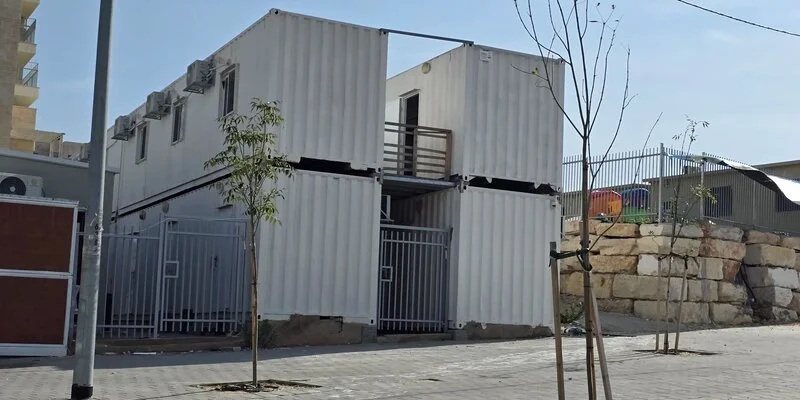Eighteen Months Into the War, Crypto Funds Continue to Flow to Hamas
After more than 18 months of war, the Gaza terror organization continues to raise funds in digital currency. It seeks donors on social media platforms and news websites – at least one of which is based in the United Kingdom. ‘To protect your security, it is critical not to reveal your identity to the person conducting the transfer,’ Hamas wrote to an anonymous donor. A Shomrim investigation into the terror funding route. Publishes also in N12


After more than 18 months of war, the Gaza terror organization continues to raise funds in digital currency. It seeks donors on social media platforms and news websites – at least one of which is based in the United Kingdom. ‘To protect your security, it is critical not to reveal your identity to the person conducting the transfer,’ Hamas wrote to an anonymous donor. A Shomrim investigation into the terror funding route. Publishes also in N12

After more than 18 months of war, the Gaza terror organization continues to raise funds in digital currency. It seeks donors on social media platforms and news websites – at least one of which is based in the United Kingdom. ‘To protect your security, it is critical not to reveal your identity to the person conducting the transfer,’ Hamas wrote to an anonymous donor. A Shomrim investigation into the terror funding route. Publishes also in N12
Terrorism and crypto. Illustration: Shutterstock

Uri Blau

Milan Czerny
May 22, 2025
Summary


Listen to a Dynamic Summary of the Article
Created using NotebookLM AI tool
In recent months, Hamas has ramped up its fundraising efforts as Israel intensifies its military campaign in the Gaza Strip. Potential donors to the Islamist terror organization are instructed to contribute exclusively via cryptocurrency and are provided with a detailed list of dos and don’ts. A Shomrim investigation reveals that Hamas’ digital wallets, which Israel claims to have blocked, are not always effectively frozen. The group is also raising funds through a media outlet operating out of the United Kingdom – despite Hamas being a designated terrorist organization there. Even the widely publicized successes of the FBI in combating terror financing appear to be far more limited than previously believed.
Hamas has been a proscribed terrorist organization in the United States and many other countries long before the October 7 attacks. Even though it is a criminal offense in these countries to transfer money to Hamas, the organization managed to amass a fortune from across the world to fund its armed wing. A Shomrim investigation published in November 2023, just a few weeks after the outbreak of the war, revealed that Israel, along with security agencies in various countries, was aware that Hamas was using cryptocurrency – but acted too late and did too little, especially since Hamas had already managed to convert the cryptocurrency from its digital wallet into cash.
Since then, it appears that the world’s handling of the problem has not improved – and a statement issued by the U.S. Justice Department in late March is testimony to this. At first glance, it appears that the statement is positive news in the fight against terror financing: the FBI stated it seized approximately $200,000 in cryptocurrency donated to Hamas. District of Columbia Attorney Edward R. Martin Jr. was quoted in the statement as saying “Hamas is responsible for the death of many U.S. and Israeli nationals, and we will stop at nothing to stop their campaign of terror and murder.”
He added that “these seizures show that this office will search high and low for every cent of money going to fund Hamas, wherever it is found, and in whatever form of currency.” The truth, however, is that this is a very partial success: even the Justice Department’s own statement confirms that Hamas has used these accounts to “launder more than $1.5 million in virtual currency since October 2024,” making this seizure relatively insignificant.

"To protect your security, it is critical not to reveal our identity to the person conducting the transfer,” This warning by Hamas was followed by detailed technical instructions regarding how to complete the crypto transfer of funds.
QR Codes, Telegram, and Terror
Hamas primarily uses social media platforms for its fundraising operations. The main platform it uses is Telegram, but Shomrim also found calls for people to donate, including an email address to contact for details, on X and several news platforms. For example, one such request for donations was published last March on a website called Arabi 21, which operated out of London. The website, which publishes news from the Arab world, has more than 1.5 million followers on X and around 10 million on Facebook. Under the headline “The Al-Aqsa Brigades call for financial support,” the website quoted from a message that Hamas sent its followers on Telegram: “During this month of jihad, this month of goodness and giving, take part in supporting the resistance (…) the first line of defense of the Islamic people.”
The site published photographs of members of Hamas’ armed wing along with a QR code that readers could scan to make a donation. There was also an email address via which readers could inquire about other ways to donate to the terrorist organization: fund@alqassam.ps. This email address first appeared several years ago in American legal documents dealing with the battle against terrorist funding. This email address is linked to the website of Hama’s military wing, which operates out of Iran, which explains why it is still active.

One anonymous donor who recently sent a message to the address, pretending to be interested in donating to Hamas, got a response almost immediately, asking him to send cryptocurrency to a digital wallet, the number of which was included in the email. The email began with the blessing “In the name of Allah” and asked the potential donor “to pray for your brothers in Gaza and Palestine.” The message went on to explain that, “because of the circumstances, the only mechanism through which you can fulfill your duty is by using digital currencies.”
The email continued: “If you lack the knowledge or the experience [to send cryptocurrency], you can ask a friend in your own country or abroad, or go to a bureau de change that also deals in crypto and show them the wallet number that appears in this email (…) To protect your security, it is critical not to reveal our identity to the person conducting the transfer.”
This warning was followed by detailed technical instructions regarding how to complete the crypto transfer of funds. “You can only use Binance to purchase the cryptocurrency,” the message stipulated, referring to the world’s largest digital currency exchange, which has been facing multiple legal and regulatory difficulties in recent years. “Thereafter, you can use other applications to complete the transfer of the donation.” The email also warned the donor “not to enter any information that could be linked to our official identity, partly to ensure that the wallet is not locked and also to protect your own security.”
Last month, the reporter.london website published an interview with Rich Sanders – an independent expert on cryptocurrencies – who has been working over the past few years in Ukraine. Sanders, it turns out, contacted American authorities – as well as the platforms via which some of the digital transfers were made – months before the FBI’s announcement. He says that, according to his analysis, a faster response could have led to the seizure of around $10 million. In a conversation with Shomrim, he explains that, since most digital currency transactions take place within just 12 hours, authorities have to act with a lot more urgency to freeze any suspicious wallet if they want to wage an effective war on the use of cryptocurrency to fund terrorism.

“If you operate in the regular way,” says former Mossad Udi Levi, “then you absolutely need the cooperation of platforms like Binance. But terrorist organizations are a lot more sophisticated and use Chinese, Russian and Iranian platforms."
The sanctions are meaningless
In Israel, the body responsible for the financial front of the country’s war on terror is the National Bureau for Counterterror Financing, which operates under the Ministry of Defense. In January of this year, Defense Minister Israel Katz signed a seizure order for 58 digital wallets linked to terror financing. However, an examination of a representative sample reveals the limitations of these Israeli warrants. While most of the wallets have indeed been blocked, preventing withdrawals, this is not the case for all of them—some transactions were made even after the seizure order was issued. For instance, one wallet, identified as TAHEHY7wQncEfQc9gJq5RWX8RfCrvuNbTC, which was listed as frozen on January 26, recorded transactions totaling $15,000 in the week following the order.
Udi Levi, the former head of the Mossad’s Harpoon Unit which focused on economic counterterrorism measures, explains that the warrants issued by Israel are, indeed, relayed on to the crypto markets, but “nobody in the world takes any notice of Israeli declarations.” According to Levi, “our problem is not in discovering or identifying the wallet. Our problem is that the defense establishment has adopted a policy of turning to the Americans for everything, instead of being more creative and carrying out operations to confiscate these funds and make them simply disappear.”
“If you operate in the regular way,” he adds, “then you absolutely need the cooperation of platforms like Binance. But terrorist organizations are a lot more sophisticated and use Chinese, Russian and Iranian platforms.”
Sanders told Shomrim that, “above all else, the platforms operating in those countries make sanctions meaningless.” He adds that using these platforms makes it possible to conduct suspicious transactions on a massive scale with very little chance that they will be monitored, since no one on these platforms tags the relevant wallets as suspicious. Sanders is also highly critical of the cryptocurrency industry. He says that the most problematic platforms – like Excoino, which operates from Iran – work alongside more “establishment” bodies in the world of crypto – bodies that are not registered in countries that have had significant sanctions imposed against them. Nobody in the industry, Sanders says, has any interest in working against them.

Snir Levi – Udi Levi’s son – is the founder and CEO of Nominis, which helps track down crypto wallets, including those used to fund terror. He agrees that speed is always of the essence when going after suspicious wallets. “Unlike the world of traditional banking, the crypto market allows you to make quick transactions at any time of the day or night, which means that the authorities have to act quickly.” He says that one of the main obstacles preventing crypto wallets from being frozen is bureaucracy and he wants to see the introduction of a system like ‘administration detention’ for crypto wallets which, if used properly, could be a significant tool for thwarting millions of dollars in terror funding.”
The Ministry of Defense and the National Council for Economic Counterterrorism did not respond to this article.













